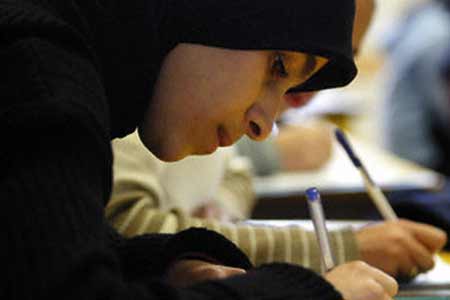
Revelations: Muslim School
Issue 59 August 2009
Documentary
Channel 4
Review by Myriam Francois-Cerrah
The latest in C4’s sensationalist programmes on religion is a series entitled Revelations which explores faith schools in Britain. As usual, it all sounds well and good until one realises the programmers are not in the least bit interested in presenting what faith schools might actually contribute to the social, moral and psychological development of the children and their relationship to broader society, rather it has everything to do with seeking to highlight the usual (tick box) issues of social segregation, judgemental attitudes, fire and brimstone, etc. The show itself wasn’t sure what it had set out to explore and so ended up being a poorly put together mish-mash of snippets from the six month period the presenter spent with Zara, seven years old, a British Pakistani girl and Aesha, a British convert, 12 years old. My main gripe with the programme was its unwillingness to engage with the very dimension which makes faith schools special – that is faith, spirituality, the relationship with God and what impact this has on young children as compared to those raised without a notion of faith. In fact, the programme hardly discussed God at all and instead chose to focus on the issues which will ensure ratings are up, regardless of how accurate the depiction of the topic actually is. Little Zara was regularly pestered about her headscarf and what she thought (at seven years old!) about it – as if somehow we were going to glean a profound insight into her adherence to her school uniform when, like most seven year olds, she continues to take her social cues from the adults around her. Innocuous situations were made into potential grounds for uproar when staring out of her bedroom window, Zara is quizzed over why she isn’t allowed to play with the kids outside – who incidentally all look about 10 years old and are wandering the streets unsupervised.
Thankfully, the precocious Zara was quick to point out there was another reason – not connected to their religion – why she was not allowed out to play with the kids in the street. Some of us would call it common sense… In the quest to find materialistic explanations for all things – in flagrant ignorance of the whole point of a programme on faith, all decisions made by the Muslims were pinned down to worldly explanations – Zara was sent to a faith school because of fear she would turn out like her mini-skirt attired (shock-horror) older sister, Aesha enjoyed wearing her hijab because she disliked her hair colour, etc. When the subject turned to paradise and hell fire, one could almost hear Dawkins fulminating over this ‘child-abuse’ which involved teaching children that there is a punishment in the next world for those who do evil acts.
The programme made for the most uncomfortable viewing when, assuming of course that the young girls were taught that all non-Muslims were going to hell and that every Muslim who doesn’t wear a headscarf was headed the same way, the presenter used the very emotionally-laden question of where seven year old Zara thought she, the presenter, would be headed in the next world. Thankfully, Zara, mature beyond her years, answered that it was important to be a good person above all else, but the programme was masterfully orchestrated to make it seem like it was her non-hijab wearing (hijab being the marker of segregation from non-Muslims of course) mother’s positive influence – a mother who ‘incidentally’ had not attended a faith school.
The presenter completely failed to see in what way Islamia is a British Muslim school, very different from a Muslim school in another country and therefore, pioneering in its development of a British Muslim identity. To even pose such a question is to presume that Islam is inherently alien to Britain, ignoring the fact that British Muslims have their own take on both Muslim identity and British identity, part of the broader mosaic of complex identities fostered by our contemporary society.
The issue is not so much a forced interaction, though interaction is vital, but knowledge and understanding of one another – you don’t have to be best friends with a Muslim – or a non-Muslim – as long as you are not left to foster hatred through false representations. Besides which, my own children interact with a range of kids outside of their (non-faith) school environment, including in their extra-curricular activities, our neighbours, the supermarket queue – it is rather naive to suggest school is the only locus for social interaction. The idea that such schools are fostering future ghettos, whether mental or actual, is the real question on everyone’s lips and yet, was never going to be tackled through this confused pseudo-sociological/anthropological ‘insight’.
Far more important than what an attention-seeking seven year old thinks of her older sister, a fraught question in any household, the programme would have done better to focus on the school curriculum, the adults involved in the teaching process, their outlook on the world and what civic culture they were seeking to inculcate. The real questions should have been posed to those mature enough to cope with their nuances, not foisted upon children and edited to fit an agenda.
As someone who hasn’t made her mind up about faith schools, I’m no further enlightened – are girls encouraged to succeed as much as boys? Are children taught about the environment? About caring for humanity? Compared with non-faith schools, are children raised with a stronger moral backbone better equipped in dealing with the complexities of modern life? The ratings may have been good, but I’m none the wiser. ¢
Bookmark this |
|
Add to DIGG |
|
Add to del.icio.us |
|
Stumble this |
|
Share on Facebook |
|
Share this |
|
Send to a Friend |
|
Link to this |
|
Printer Friendly |
|
Print in plain text |
|


Comments
0 Comments